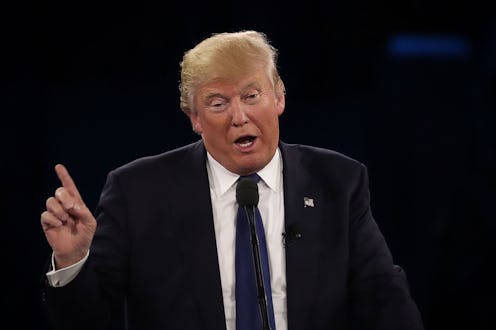News
Donald Trump And Jedi's Shared Secret To Success
Donald Trump's national spokeswoman, Katrina Pierson, told CNN's Don Lemon on Tuesday that Trump, the Republican presidential frontrunner, didn't attack Heidi Cruz when he recently retweeted an image that compared her looks to those of his own wife, Melania Trump. "That is not an attack, no," Pierson told Lemon, insisting that Trump was simply complimenting his own wife and defending her from attack. Pierson stood by this flying-in-the-face-of-logic claim, despite the fact that her boss had shared a purposefully unflattering photo of Cruz next to a highlighter-on-fleek photo of Melania with some accompanying text that was clearly meant to insult her.
Not only did Pierson deny that Trump was engaging in mudslinging (to be clear, he is), but she also found a way to accuse the media of fabricating the narrative of attacks on Cruz (which is untrue) and ignoring attacks on Melania (also untrue). And all in an interview that lasted a little more than five minutes. Like most of the verbal and mental gymnastics in this election cycle, it'd be sort of impressive if it wasn't so horrifying.
This pattern of untruths is sadly nothing new in the 2016 presidential race. Trump's stalwart aversion to the truth has been well-documented since day one. The problem isn't a lack of receipts for the outlandish claims, backtracking, or hateful rhetoric — it's that exposing them just doesn't seem to matter anymore. Ultimately, nothing sticks to Trump. Pierson's performance in the Lemon interview exemplifies the Trump strategy we've witnessed in just about every debate, interview, and Twitter rant since the real estate mogul announced his candidacy. Let's call it "The Art of Denial."
We've watched it play out before. Trump says a thing. It could be a promise to shut down the borders to immigrants, pay the legal fees of violent supporters, or some inflated claim about his business prowess. The media then refutes the claim with video, audio, or documents that clearly show it is unfounded, morally reprehensible, or simply not in line with whatever Trump has said or done previously. Trump (or his camp) responds with an outright denial of Jedi mind trick "these aren't the droids you're looking for" proportions. Other members of the media have called out Trump and his campaign for this strategy, but watch the video below to see what I mean.
In other words, Trump and his cohorts rely on a reframing that clarifies and rewrites his untruths to be more palatable. And then he goes on the attack, usually claiming that the media has been "unfair" to him. Lather, rinse, repeat.
Russ Choma at Mother Jones pointed out this phenomenon after Trump's campaign manager, Corey Lewandowski, was criticized for allegedly manhandling reporters and protesters at campaign events. For example, former Breitbart News reporter Michelle Fields said Lewandowski had grabbed her at an event in Florida earlier this month — and Trump implied that Fields fabricated the story, saying, “[his secret service agents] said nothing happened; everybody said nothing happened. Perhaps she made the story up. I think that’s what happened." Citing a 2011 panel (moderated by Lewandowski) featuring the late conservative media figure Andrew Breitbart, Choma argued that Trump's camp picked up a strategy of "deny, deny, deny and counter-attack" from Breitbart's theories on how politicians could get away with lying (which he explained through the lens of the Monica Lewinsky scandal in the 1990s).
As timing would have it, Lewandowski was charged on Tuesday with battery against Fields, but Trump and his campaign have adamantly proclaimed Lewandowski's innocence. They have done so despite a security video that "showed Mr. Lewandowski grabbing her [Fields] and pulling her away from the candidate," according to a New York Times article that cited the police report filed in the incident.
It's admittedly infuriating to watch consistent lies — each one seemingly more flippant and careless than the last — flow out of Trump's pursed lips without any consequences. Meanwhile, Trump continues to harness all the negative headlines featuring his name to bolster his own anti-media arguments.
However, the "dodge, deny, attack" method is only half of the problem. To work, it relies on the considerable number of Americans who aren't that concerned with things like "facts" or "the truth." Instead, they rely on what Stephen Colbert called "truthiness" waaay back in 2005. (Remember 2005? When Donald Trump was best known for mediocre reality TV and oversharing about his sex life with Howard Stern? I miss it.)
"Truthiness," as Colbert explained it, isn't about the business going on in the brain or about saying things that can be confirmed through research, documentation, or facts. Instead, it's what happens "in the heart" and "in the gut" (what many affectionately call our "lizard brains"). Audiences won over by "truthiness" don't care about the call-outs, the fact-checks, or the pages of investigative reports; they care about what "feels right" or "good."
Unfortunately, a captive audience relying on rhetoric that soothes the lizard brain, paired with a politician who can (along with his staff) easily employ the kind of strategies that remove truth from the equation, creates a perfect storm (arguably the perfect sh*tstorm) to leave the media floundering. And ultimately, that ensures there is no such thing as accountability in this election cycle.
Images: Giphy.com
